On https://youtu.be/GIRcpBEzO9o: Documenting a Real-Life Super Hero (Interview)
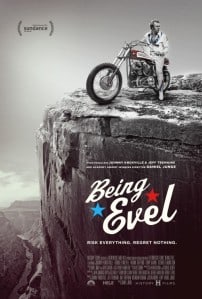 You’ve probably heard of Evel Knievel, the larger-than-life daredevil who spent his life jumping over everything from rattlesnakes and cougars to buses and canyons on his trusty Harley-Davidson motorcycle. By the mid-1970s he was bigger than Elvis, and with a jump suit to match. Oscar-winning film maker Daniel Junge has just make a documentary about the real Evel Knievel and it promises to be a highlight of this year’s New Zealand International Film Festival. Junge interviewed seemingly everyone who ever met Robert “Evel” Knievel, including his long-suffering wife, his business associates (including the one who’s arms he broke with a baseball bat) and his son, Robbie, who has attempted to follow in his father’s dubious footsteps. Its a riveting story, and Junge has brought modern-day daredevil Johnny Knoxville along to help tell it. The 13th Floor’s Marty Duda spoke with director Daniel Junge about the making of Being Evil...the man who attempted to jump the Snake River Canyon on a rocket-powered motorcycle.
You’ve probably heard of Evel Knievel, the larger-than-life daredevil who spent his life jumping over everything from rattlesnakes and cougars to buses and canyons on his trusty Harley-Davidson motorcycle. By the mid-1970s he was bigger than Elvis, and with a jump suit to match. Oscar-winning film maker Daniel Junge has just make a documentary about the real Evel Knievel and it promises to be a highlight of this year’s New Zealand International Film Festival. Junge interviewed seemingly everyone who ever met Robert “Evel” Knievel, including his long-suffering wife, his business associates (including the one who’s arms he broke with a baseball bat) and his son, Robbie, who has attempted to follow in his father’s dubious footsteps. Its a riveting story, and Junge has brought modern-day daredevil Johnny Knoxville along to help tell it. The 13th Floor’s Marty Duda spoke with director Daniel Junge about the making of Being Evil...the man who attempted to jump the Snake River Canyon on a rocket-powered motorcycle.
Click here to listen to the interview with Oscar-winning film director Daniel Junge:
Or read a transcription of the interview here:
MD: I know you’re from Wyoming and you live in Colorado and the film has a kind of wild West flavour about it anyway, kind of modern wild West, Evel being from Butte, Montana and all that. I was wondering if you being from that part of the country influenced, or had an effect on the way you approach the film?
DJ: Well I think that Evel caught the fancy of the entire nation of that time. I mean arguably he was possibly the most famous man in the country for a short time there. So all kids around the country knew about him, but I think that, yes, for those of us in the West maybe he caught our fancy a little bit more just because of the region he was from and sort of that can-do or that kind of, that certain can-do attitude which I thing is pervasive in the West. And furthermore, I did visit the Snake River within a year of his jump to Snake River. My family took us up, my brother and I up to see the place where he jumped, Snake River, so that looms large in my memory.
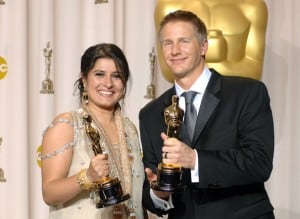
MD: I can imagine, yeah. I have to say, within the first 20 minutes especially of watching the film there were actually, literally tears in my eyes from laughing so much. Especially the story about one of his early stunts with the snakes and the cougars and flying up, I mean I’ve just never heard that before. I was watching with a friend of mine and we were just in stitches for that first bit, it’s amazing. It’s a great way to get introduced to him.
DJ: And it’s certainly…(Johnny) Knoxville has said this in many interviews too…for those of us making the film that thought we knew the Knievel story, it was the early years that held the most surprises for us and a lot of the Evel before he was Evel and seeing some of the, seeinhg the vestiges of what would come, that was kind of the most fun, one of the most fun aspects of making the film.
MD: Yeah, I mean I’m old enough to, I grew up in the States, I know about Evel or at least I thought I did but all that is brand new to me I must say, it was fantastic. I’m curious as to, yeah I mean it looks like you did an awful lot of research, had an awful lot of people on camera. How did you go about finding these people? There’s scores of them it seems like.
DJ: Well most of the…a lot of the subjects came…first of all I should say that the most interview Subjects I’ve ever had in any previous film was about 20, we had 60 in this film. So that was kind of the approach, that was our approach, was to let no stone be unturned and to try to find, because we wanted first person witnesses to history and we wanted every aspect of Knievel’s life to be told by somebody who was there if possible. So that was the intention and to do so we literally pulled every name possible out of every biography or article read or other film done, we got a lot of subjects that way. But then other people just pointed and said you should do that person, or you should do this person. And there were a few interviews, I guess Earl Castine is one who comes to my mind, who was just, he was, when we went to Knievel Days he was there as one of the old Knievel brethren who showed up at Knievel Days and just met him there and got him on camera in Vegas.
MD: Were people…I assume they were generally quite happy to talk about him…relatively open about him especially since he’s not around anymore.
DJ: Yeah. There were a few people who abstained because as you saw there were some dark chapters to his life.
MD: Yeah.
DJ: There were a few people from those chapters who chose not to, who felt like they didn’t, don’t speak ill of the dead and they didn’t want to be on camera. But for the most part, yes, people jumped at the opportunity and we
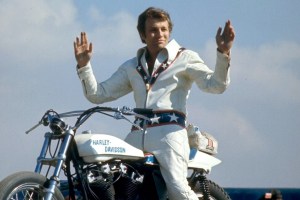
also got a bevy of archival footage from people who wanted to share their stuff. We had even people just finding us and sending us footage to put in the film.
MD: That’s got to fantastic when that happens. But having that much material, how did you go about sifting through it all?
DJ: That’s the thing, The film is a 100 minutes long and had I had my way it would have been another 100 minutes long.
MD: Yeah.
DJ: Because there was so much incredible stuff. At a certain point you have to say, I’m going to bare in mind the audience’s patience but also the budget only allowed for…for us it became the most important thing was that the film continued to surprise and be interesting all along the way and if there’s ever a point you feel like you’re being told the same thing again then we need to pull that out and move on.
MD: The pace is incredible, I mean it just keeps going and going and I think you achieved that without any problem at all.
DJ: Thank you.
MD: Yeah.
DJ: Yeah, no I think, I mean safe to say I’ve made a lot of documentaries and the truth is most documentaries are too long and probably some of mine are too and we just did not want to make that mistake on this film.
MD: Speaking of your previous documentaries, this is a very different subject matter from what you’ve dealt with before, so what caused you to kind of choose Evel as a subject and kind of move in this direction?
DJ: I mean I’ve done, historically I’ve done more social issue films and it was just a few years ago that I decided to really challenge myself, I wanted to do more popular subject matter and also felt like I had the mojo to do so after winning the Oscar which was very helpful.
MD: Yeah.
DJ: And so after winning the Oscar, I pitched the film that I wanted to do more than anything else and that was this film. Day and Ian thankfully, they said yes and 2 years later we were premiering the film at Sundance.
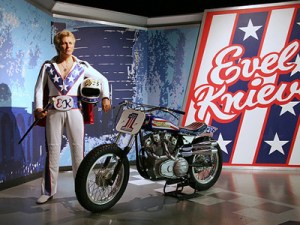 MD: Was there any resistance to you making a film about Evel Knievel? It seems like a no-brainer after watching it.
MD: Was there any resistance to you making a film about Evel Knievel? It seems like a no-brainer after watching it.
DJ: No, I mean there might have been, I mean when it was A&E that paired us with Knoxville and it was a great partnership but at first maybe they might have been wondering who is this really serious filmmaker doing…I was reminded quite a bit up front that the film needs to be fun. So there might have been a question of whether I was able to do that and hopefully the film is fun.
MD: Oh yeah. How important was it having Johnny Knoxville involved in it? Was that kind of a move in order to connect with younger viewer?
DJ: In a way that was kind of a happy accident because I didn’t set out to work with him, we were paired with him by the network, by A&E and it just ended up being a great partnership. He’s actually a surprisingly serious guy, he’s very intense in the filmmaking process, he actually, he must have looked at 20 cuts of the film and given notes to the frame. He is a very serious guy and this is a subject that’s near and dear to him. So he was really diligent. So it was a great experience.
MD: And your kind of co-writer and editor on the film was a guy named Davis Coombe is that right?
DJ: Yeah, he’s been my partner on all of my films. He’s been editor on pretty much all of my films and a producer in some capacity. It’s Davis and I that really end up making these films in the edit room together.
MD: So how did the two of you work? How would you explain the relationship between you two?
DJ: We yell at each other a lot, we yell, we throw things at each other.
MD: That’s about right, I’m a video editor myself, so I can imagine what that’s like.
DJ: No, it’s a great partnership and I think that we do have a feisty relationship which I think is helpful between a director and an editor/co-producer.
MD: And a lot of the interviews, you had to go up to Butte, Montana to shoot. I imagine they don’t get a lot of media up there, it’s a fairly out of the way place. What was it like coming into the town and making a film? Were they welcoming you, were they suspicious about you?
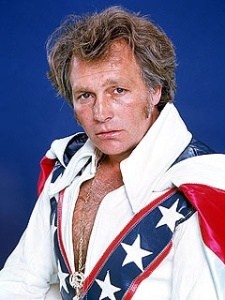 DJ: Well it’s interesting cause’ you mention Knievel and he’s a lightning rod up there. No more so is he both herosised and demonised.
DJ: Well it’s interesting cause’ you mention Knievel and he’s a lightning rod up there. No more so is he both herosised and demonised.
MD: Yeah.
DJ: And more so than anyone in the country because people up there love him or hate him again because they, some of them have personal experiences, unpleasant personal experiences with him. So you just have to kind of gently, you have to been real gentle about what you’re saying and what you’re doing up there and gage people’s impressions of Knievel and then behave accordingly. I will say this that we, the whole film was shot green screen, I don’t know if you could tell that.
MD: I couldn’t
DJ: All the interviews were green-screen. So we placed all the subjects into this theatre digitally.
MD: Right.
DJ: So obviously there is no green screens in Butte so we had to construct one in a space downtown.
MD: Right. So hit the hardware store for the green paint and off you go.
DJ: Exactly. A lot of green paint, green cloth and then a lot of the digital compositing guys yelling at me in post.
MD: Yes. I can imagine. I’ve got to say the most affecting person that I think you interviewed or the one to really kind of got to me was his wife Linda. She came across most painfully honestly about her relationship with Evel Knievel. What were those interviews like with her?
DJ: Yeah those were some of the more difficult interviews that I’ve ever done. First of all, it was a coup to get her in the film at all because she’s incredibly, she likes her anonymity now and she likes to live out of the spotlight and so the fact that she agreed at all. I think it’s also a testament in some ways to Knievel but also to the people that we’ve interviewed that some of those people should be the most spiteful are some of the most forgiving people and some of those that were closest to him in his life are those who are the most brutally honest now and I think that’s just a testament to their character and to this larger than life man that they all came in contact with.
MD: Yeah. The other family member…
DJ: I probably have time for 1 or 2 more here I’m sorry…
MD: Okay, no problem. The other family member is their son, who, when I’m telling people that I’m seeing this film, people are very aware of him and very curious about what he’s doing and how he is. What kind of shape is he in?
DJ: He’s not in great shape. Yeah, it’s interesting, you can tell what era, you can almost tell the age of people whether they identify more with Evel Knievel or with Robbie Knievel.
MD: Yeah.
DJ: Because he really represented the next era on. So a lot of people say 40 and under are very interested in where Robbie is. Robbie, in theory is still jumping. If you go to his website or listen to interviews, he’s still actively pursuing jumps but he’s lived a hard life just like his dad did and I think that shows in his interviews too.
MD: Yeah. Alright one more question. You previewed the film at Sundance, what was that experience like for you?
DJ: I mean you if you can’t have fun at Sundance as a filmmaker than you better reconsider your profession.
MD: Right.
DJ: It was amazing. I was a volunteer at Sundance 20 – 25 years ago, 20 years ago, I was a volunteer at numerous festivals. I’ve been very fortunate with my career, been nominated for a couple of Oscars and won an Oscar, been to all these major festivals and won awards and Sundance has always eluded me and I’ve been very aware of that and to finally have a film there, especially this film, which was so personal to me, which just a completely redemptive experience.
Click here for more information about Being Evel at the NZIFF
Watch the trailer for Being Evel here [youtube https://www.youtube.com/watch?v=R92EDpRTEPo]
- Civil War – Dir: Alex Garland (Film Review) - April 9, 2024
- Pearl Jam – Dark Matter (Monkeywrench/Republic) Album Review - April 1, 2024
- Blonde Redhead – New Zealand Tour 2024 - March 14, 2024
